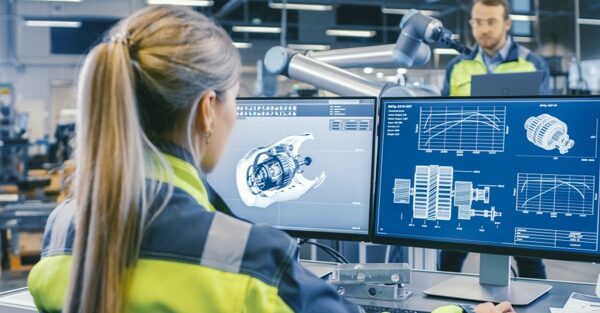Artificial Intelligence (AI) has rapidly evolved in recent years, revolutionizing various industries. One sector that has experienced significant transformation is mechanical engineering. AI has proven to be a game-changer in this field, enhancing efficiency, precision, and overall productivity. By integrating AI into various processes, mechanical engineers are now able to overcome complex challenges and achieve remarkable advancements. In this article, we will explore the role of AI in mechanical engineering and how it is shaping the future of this industry.
Revolutionizing Mechanical Engineering: The Emergence of Artificial Intelligence
The emergence of AI has paved the way for unprecedented advancements in mechanical engineering. From designing intricate machine components to optimizing manufacturing processes, AI has become an invaluable tool for engineers. With the ability to process vast amounts of data and analyze complex systems, AI has enabled engineers to develop innovative solutions and make informed decisions. It has significantly reduced the time and effort required in the design and development phase, allowing engineers to focus on more critical tasks.
One notable application of AI in mechanical engineering is computer-aided design (CAD). Traditionally, engineers would spend hours designing intricate components manually. With AI-powered CAD software, engineers can now generate designs quickly and accurately. These software programs use machine learning algorithms to analyze existing designs and generate optimized versions based on specified parameters. This not only saves time but also ensures the design meets all necessary requirements, resulting in more efficient and reliable products.
Furthermore, AI has revolutionized manufacturing processes. Automation powered by AI has become the norm, with robots and machines equipped with AI algorithms taking over repetitive tasks. This has not only improved efficiency but also reduced the risk of human error. AI-driven robots can perform tasks with higher precision, leading to improved overall product quality. Moreover, AI can analyze production data in real-time, allowing engineers to identify and address any issues that may arise, further optimizing the manufacturing process.
Enhancing Efficiency and Precision: Harnessing AI in Mechanical Engineering
AI has become a vital tool for enhancing efficiency and precision in mechanical engineering. One area where AI has proven to be particularly beneficial is predictive maintenance. By analyzing real-time data from various sensors and machines, Artificial Intelligence algorithms can detect patterns and predict potential failures before they occur. This allows engineers to schedule maintenance and repairs proactively, minimizing downtime and preventing costly breakdowns. By implementing AI-powered predictive maintenance systems, companies can save significant resources and improve overall operational efficiency.
Another area where Artificial Intelligence is making a significant impact is in the optimization of mechanical systems. AI algorithms can analyze complex systems and determine the most efficient configuration based on predefined objectives and constraints. This optimization process helps engineers design systems that achieve optimal performance while minimizing energy consumption and environmental impact. From HVAC systems to automobile engines, AI plays a crucial role in ensuring efficiency and sustainability.
Furthermore, AI is also being used in simulation and testing processes. Virtual simulation allows engineers to analyze and test mechanical systems in a virtual environment before physically building them. AI algorithms can simulate various scenarios and predict the performance of different designs, helping engineers make informed decisions. This not only saves time and resources but also enables engineers to identify potential issues and make necessary improvements early in the design phase.
The Role of Artificial Intelligence in Mechanical Engineering
Artificial Intelligence is revolutionizing the world of mechanical engineering. From designing intricate components to optimizing manufacturing processes and enhancing efficiency, AI has become an indispensable tool for engineers. Its ability to analyze vast amounts of data, predict failures, and optimize systems has resulted in remarkable advancements in this field. As AI continues to evolve, the possibilities for its application in mechanical engineering are endless. By harnessing the power of AI, engineers are shaping the future of this industry, paving the way for more efficient, precise, and innovative solutions.



